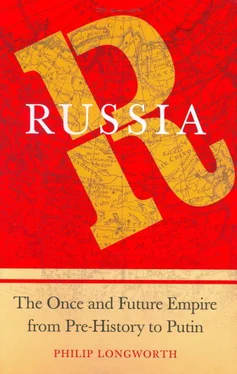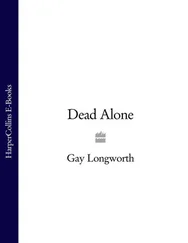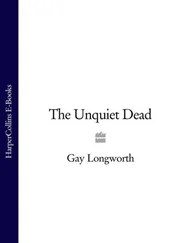After Yeltsin they were distinctly unpromising. In Putin’s first five years of office, however, the annual growth rate was in the region of 8 per cent a year, thanks largely, though by no means completely, to burgeoning oil revenues. If such a rate were to be maintained, GNP might well double within a decade. Since Yeltsin’s departure progress has been made to bring order to the disorderly state of affairs that was his legacy. The ruble has been stabilized, and Russia’s credit ratings have risen; corrupt localism has been restricted, social conditions have improved, and the new regime has committed itself to the rule of law. But problems remain. The media are not as free as they were, the limits of centralization have yet to be established, and the as yet unresolved Khodarkovskii case has raised doubts about the relationship between government and big business, between the state and the forces of free enterprise. Though often presented as incompatible, these are in fact complementary. Russia needs investment capital which only the world market can provide; but companies need to operate within a legal framework which only the state can maintain. If an accommodation between them is reached, the economic recovery should continue. If not, Russia will face unpleasant alternatives: either a return of the over-mighty state or untrammelled corporate greed.
In the long term, Russia’s economic power is contingent on the extent of its market and the size of its population. Perhaps the most serious consequence of the collapse was demographic weakness. Russia’s population continued to fall for more than ten successive years at the end of the last century. The climbing death rate of the Yeltsin years eventually eased off, but the birth rate failed to recover. According to the preliminary results of the 2002 census, the population in October of that year was 145.2 million — almost 2 million fewer than in 1989. 3And there is a qualitative as well as a quantitative problem. Russia has been suffering from a ‘brain drain’. Many able young Russian scientists and economists, entrepreneurs and engineers who might otherwise have contributed to the new Russia now live and work in the West.
Not since the first Time of Troubles, at the beginning of the 1600s, have Russia’s fortunes been so low. Yet its recovery then was amazingly rapid, and it was soon on the expansionist path again. What, then, of Russia’s prospects now?
Emerging from their second Time of Troubles, the Russians themselves have been less interested in empire than in political stability, economic regeneration and the elimination of social distress. Putin has understood this. In his address to the country on 26 May 2004 he stated his priorities: ‘A stable democracy and developed civil society… the strengthening of Russia’s international positions. But… [above all] substantial growth in the well-being of our citizens.’ 4The social objectives at least may soon be attained. Even if they are not, Russia’s status as a major power, though not as a superpower, will be maintained.
In the opinion of a Western analyst, the idea that the collapse of the Soviet Union implied the end of Russia’s great-power status is mistaken. All that happened was that ‘One of the world’s undisputed great powers temporarily subordinated its foreign and domestic policies to the West’s capricious preferences. This state of affairs was never likely to last long.’ 5Russia is still the only power that stretches right across the land mass of Eurasia, and it is vital to the stability of every country situated there. 6The prospects of building an empire of the dimensions of its last two predecessors lie far beyond its present reach, of course. Nevertheless the Russians still possess a number of advantages that could lead to their building a new sphere of influence, and even territorial enlargement, in the more distant future.
One obvious advantage Russia has over most countries in the modern world is its large reserves of every kind of strategic commodity from diamonds to natural gas, and from aluminium to uranium. Another lies in the superior quality of its educational system, which is geared to detect special talents in young children and develop them in special schools. Despite the brain drain, Russia will not lack for learning and expertise to exploit its material advantages, and with its tradition of careful planning it should make the best of them. However, a strong state cannot be based on a shrinking or static population and until now, as we have seen, Russia’s demographic situation has been very weak indeed. Only in 2003, for the first time since the collapse, did Russia’s birth rate rise, and then only very slightly 7If this should mark the beginning of an upward demographic trend, however, the prospects for longer-term revival will be strengthened. Furthermore, Russia’s strategic position has been improving fast of late, thanks partly to circumstances, partly to Moscow’s adroit exploitation of them.
The collapse of the Soviet Union left some successor states even worse off than Russia. Belarus has ever since been seeking reunion, and Ukraine, despite chances of being accepted into NATO’s protective embrace, needs the Russian market and therefore remains ambivalent about the West, keeping its options open. Both states have large numbers of Orthodox communicants as well as other historic ties which make many of their citizens sympathetic to Moscow. Russia may yet prove the preferable option for Ukraine both for trading purposes and to ensure energy supplies. Russia’s ability to interrupt or cut off the flow of oil and natural gas not only to what Russians call ‘the near abroad’ but to Western Europe and the Balkans too gives it considerable clout. So does its continuing occupation of Kaliningrad, the Baltic port once called Konigsberg which it acquired in the eighteenth century and contrived to hold on to both in 1945 and in 1991.
This powerful naval base wedged in between Lithuania and Poland on the Baltic frightens its neighbours and is a serious nuisance for NATO, but when the withdrawal of Russian troops from Lithuania in August 2003 prompted demands for its demilitarization Moscow refused. The retention of the enclave provides it with a powerful lever, and it is not the only one at Moscow’s disposal. The presence of large Russian-speaking minorities in the Baltic states provides another. The states which host them distrust them, and, as we saw in Chapter 15, there have been charges that Russians in the ‘near abroad’ are denied civil and political rights. Moscow can exploit and even manipulate this situation to its advantage.
Russia’s position in the Caucasus is no less strong, though the commitment is expensive because of the need to contain Chechen extremism. Since 11 September, however, the Western Powers have become more sympathetic to Moscow’s point of view. The troubles will eventually subside for a time when the insurgents tire, as has always happened in the past. Meanwhile, despite the dreadful costs, no Russian government dare give in. The safety of the northern Caucasus, of oil pipelines from the Caspian Sea, and of communications to the south is an interest which Moscow cannot afford to jeopardize.
Georgia has become an American client — though an unstable one — but with allies in the Georgian provinces of Abkhazia and Ossetia, which dislike rule from Tbilisi, Russia can still exert influence there. Armenia, to the south of Georgia, still aligns with Russia and, thanks to careful nurturing over many years, Russia’s relations with Iran are good. Along with the other states bordering the Caspian Sea, the two countries have agreed the bases of exploiting its oil and gas reserves, but Russia’s position is stronger than the rest because of its pipeline facilities.
In Central Asia Russia’s position is stronger still. Kazakhstan, the largest state in the region, is a firm ally, and Russia maintains test sites, an air base and a cosmodrome on its territory. The Uzbeks and the Kyrgyz as well as the Kazakhs know the Russians well and trust them more than other outsiders. Turkmenistan exports its natural gas through Russia, and Tajikistan has so far allowed Russian troops to patrol its frontiers with Afghanistan. A common concern to combat Islamic fundamentalism and to stabilize Afghanistan have recently brought Russia and the United States closer than for decades, but Russia now seems to be the preponderant strategic influence in Central Asia once again.
Читать дальше





![Stephan Orth - Behind Putin's Curtain - Friendships and Misadventures Inside Russia [aka Couchsurfing in Russia]](/books/415210/stephan-orth-behind-putin-s-curtain-friendships-a-thumb.webp)





